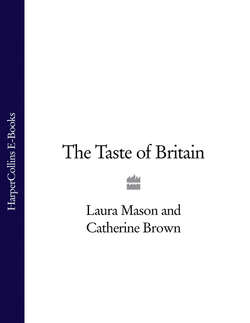Читать книгу The Taste of Britain - Hugh Fearnley-Whittingstall - Страница 339
FLAVOUR: WHITEBAIT ARE VALUED AS MUCH FOR THEIR CRUNCHY TEXTURE AS THEIR FLAVOUR, WHICH, WHILST MILDLY FISHY, IS MASKED BY THE FLAVOUR OF HOT FAT DURING FRYING AND THE LEMON JUICE WITH WHICH MOST PEOPLE SEASON THE DISH JUST BEFORE EATING IT. HISTORY:
ОглавлениеWhitebait may be a mixture of the fry of herring (Clupea harengus) and sprat (Sprattus sprattus), or the fry of sprat alone. Historians have claimed whitebait first appeared on an English menu as long ago as 1612 (Davidson, 1979). The name derives from the use of these small fish as bait for catching other fish (OED). It seems that they really became important as food in the mid-eighteenth century. For at least a century after this time, they were a noted speciality of Blackwall and Greenwich, downstream from the City of London (Mars, 1998).
There was much controversy over the exact nature of whitebait, some claiming that it was actually a separate species. This debate was still alive in 1861 when Mrs Beeton stated, ‘This highly esteemed little fish appears in innumerable multitudes in the river Thames, near Greenwich and Blackwall, during the month of July, when it forms a tempting dish to vast numbers of Londoners who flock to the various taverns of these places in order to gratify their appetites … The ministers of the Crown have had a custom, for many years, of having a “whitebait dinner” just before the close of the session.’ This ministerial dinner has origins more banal than epicurean delight in fish fry. There used once to be an annual shindig held at Dagenham by the commissioners for embanking the River Thames. To one of these, in the 1790s, Pitt the Younger was invited and brought some of his Cabinet colleagues. The habit stuck but the location was shifted to the more salubrious Greenwich in the early part of the next century. Only then did they start to eat whitebait. The tradition continued until 1894.
Whitebait still shoal in the mouth of the Thames but the fishery has declined. According to one of the few remaining fishermen, demand for the fish has dropped, partly because they are cooked by deep-frying, now considered an unhealthy method, and because imported whitebait are cheaper than fish caught locally, due to the way in which the fishing industries of other countries are subsidized.
The fishing of whitebait is no longer encouraged because of the implications for fish stocks, though the sprat is not under any threat at present. A whitebait festival was held annually at Southend, down the estuary, at the same time as a ceremony of blessing the sea.
